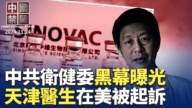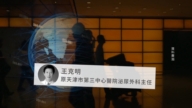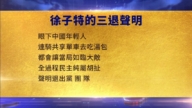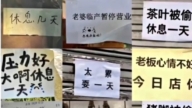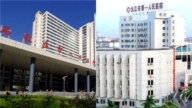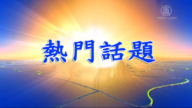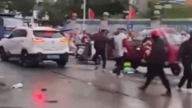【新唐人2014年12月15日訊】南京大屠殺77週年之後,中共開始把12月13號這一天定為「國家公祭日」。當天,中共各大媒體對此進行大幅報導,而習近平也出席公祭活動。有評論認為,在過了77年之後,中共突然設立南京大屠殺國家公祭日,是出於政治需要。而在中共執政期間,被人為餓死的幾千萬人中國人,以及在當權者發起的各種運動中死於非命的國人,更應該被公祭。請看報導。
13號,中共舉行國家公祭儀式,紀念在南京大屠殺中遇難的同胞。習近平親自來到「南京大屠殺遇難同胞紀念館」前的廣場,為公祭鼎揭幕。
南京民主人士孫林:「據我的朋友在電報亭裡了解到,這次規格是相當高。而且周圍靠近建築的各個社區以及辦公室,在一個禮拜以前就禁止開窗,每個樓層都安排了兩個警察。」
南京民主人士孫林表示,從搞公祭的表面上看,中共可能是對日本要有一定的打壓,這應該與當前和日本的關係有關。
中共各大媒體都大幅報導了「南京大屠殺死難者國家公祭日」活動,同時還都對日本提出譴責和警告。《人民日報》還提到,在1937年12月13號,日軍佔領當時的首都南京後,在隨後的六個星期內,日軍在南京屠殺了約30萬中國人。
網路作家荊楚:「本來公祭南京大屠殺,這個事情是有道理的,但是你要一視同仁,不要雙重標準。長春圍城餓死30多萬老百姓,也應該公祭啊﹔唐山大地震,40萬老百姓也應該公祭啊。」
歷史資料顯示,1948年中共軍隊圍困長春,當時駐守長春的是國民黨軍隊。為了消耗長春城內的糧食供應,中共不讓長春城內的平民出逃,造成近數十萬人被活活餓死。事後,中共極力掩蓋這一人為的慘重災難,而且沒有一絲愧疚的說「解放長春兵不血刃」。
網路作家荊楚指出,唐山大地震後,中共也是拒絕世界上一切救援,讓地震的災難進一步放大,使得24萬人死亡,16萬人傷殘。
網友「趙詩斌」指出,「49前長春圍城餓死三十萬人,49後餓死三千多萬人,也得公祭,是吧?」網友「醒醒吧-辛巴」也在微博上寫到:「緊盯三十萬漠視三千萬的……都是愛國賊!!!」
荊楚表示,中共對在三年「大饑荒」中,被餓死的3000多萬人,也不去公祭,而在南京屠殺77年後去公祭,這種選擇性的做法是洗腦的老套,也是挑起民族仇恨的作派。
北京時政分析人士華頗:「我們要記住37年南京大屠殺,記住日本軍國主義對我們這個民族、人民造成的傷害,但是,反右鬥爭、三面紅旗、大躍進,文革,給我們這個民族帶來的傷害,並不次於日本軍國主義份子對我們的傷害。」
孫林指出,與在國際戰爭形勢下發生的南京大屠殺相比,在和平形勢下那些被餓死的中國人,那些被用坦克、槍支殺害的手無寸鐵的學生,他們更值得大家用高規格去紀念。
實際上,此前雖然中共對日本表面上吵吵鬧鬧,心裡卻似乎對日本「心存感激」。
在1964年7月10號,毛澤東對日本社會黨委員長佐佐木更三表示:沒有你們皇軍侵略大半個中國,中國共產黨就奪不了政權。所以,日本皇軍是中共的大恩人,大救星。
1972年簽署中日建交,毛澤東對日本首相田中角榮同樣表示,日本要不是發動侵華戰爭,中共不可能打敗蔣介石,所以中共不要日本的戰爭賠償。
因此,外界認為,中共這次公祭南京大屠殺,看來也是時局的需要。
採訪/田淨 編輯/宋風
CCP Sets up Memorial Day for Nanking Victims
The Communist regime set Dec. 13 as the National Memorial
Day, 77 years after the Nanking Massacre.
Mainland media were filled with reports of the public memorial
attended by Xi Jinping, and condemning the Japanese crimes.
Why did the CCP set the day when Nanking Massacre took place
as national memorial day, 77 years after the incident?
Please follow our report.
The CCP held a national memorial service on Dec. 13
to commemorate the Nanking Massacre victims.
At 10:00 sharp, all moving vehicles, trains, and boats
in Nanking stopped operating and sounded horns
and whistles for 1 minute to pay their respects.
Xi Jinping attended the memorial and the opening of a
memorial tripod in front of the Nanking Massacre
Memorial Hall.
Xi Jinping’s address at the ceremony, named the
Nanking Massacre as one of “the three major tragedies"
of World War II, and a crime against humanity.
Nanking activist Sun Lin: “According to a friend in the teletex
booth, it is highly regulated this time.
Nearby communities and offices were banned from opening
the windows. Every floor was arranged with two policemen."
Sun Lin believes the memorial suggests the CCP tries to put
pressure on Japan due to recent Sino-Japan relations.
Major Communist media have substantially reported
the memorial activity and issued condemnation and warning
to Japan.
People’s Daily wrote, “The establishment of the National
Memorial Day is to strengthen the national memory."
In Dec, 1937 Japanese troops occupied Nanking,
the then capital, and killed 300,000 Chinese
within the next six weeks.
Internet writer Jing Chu: “It makes sense to hold a memorial
for the victims of the Nanking Massacre, but with
no double standards.
More than 300,000 Chinese were starved to death during
the Changchun siege, there should be a public memorial
for those victims too.
The Tangshan earthquake killed 400,000 people,
there should also be a public memorial."
In 1948 the Chinese Communist Party military
besieged Changchun where the Kuomintang troops were
stationed.
In order to consume the food and supplies in the city
of Changchun, the Communist army would not let civilians
flee the city, hundreds of thousands of Changchun people
starved to death.
Later, the CCP tried all means to cover up the man-made
catastrophe, and even claimed without a trace of guilt,
“Changchun was liberated without firing a shot."
Jing Chu points out that after the Tangshan earthquake,
the CCP rejected all foreign aid and caused further disaster
to the victimized area.
Consequently, 240,000 people died and 160,000 disabled.
Netizen Zhao Shibin stated, “Changchun siege starved
300,000 people to death before 1949,
another 30 million people were starved to death after 1949,
there should be public memorials for them too, right?"
Netizen, Wake – Simba, wrote: “Target the 300,000,
but ignore the 30 million…simply theft in the name of patriotism!!!"
Jing Chu indicates, there is no public memorial for more than
30 million Chinese who died from Mao’s Great Famine,
but one for the Nanking Massacre, 77 years later.
This selective approach is simply brainwashing
and an old tactic to stir up hatred among peoples.
Beijing China politics analyst Hua Po: “We have to remember
the Nanking Massacre in 1937,
the damage Japanese militarists had done to our nation
and our people.
But, the damage to our nation from the anti-rightist struggle,
Three Red Banners, Great Leap Forward,
the Cultural Revolution, was not less than
what the Japanese militarist elements had done to us."
Sun Lin points out that compared with the Nanking Massacre
during the international war, those Chinese who were starved
to death and those students who were killed by the tanks
and guns during peace time,
are even more worthy of high profile commemoration.
In fact, behind the noise against Japan on the surface,
the CCP have been “grateful" to Japan’s invasion.
On July 10, 1964, Mao Zedong had expressed to the Japanese
Socialist Party chairman Kouzou Sasaki:
Without your imperial army invading China,
the Communist Party of China would not have seized power.
Therefore, the Japanese Imperial Army is the great savior of the CCP.
When Sino-Japan diplomatic relations were established in 1972,
Mao Zedong also told then Japanese Prime Minister
Kakuei Tanaka that,
if Japan had not launched the war of aggression against China,
the CCP would not have defeated Chiang Kai-shek.
Therefore, the CCP would not seek war reparations from Japan.
It looks like the public memorial of the Nanking Massacre
takes place in the needs of the current political situation.
Interview/TianJing Edit/SongFeng





